Engineering plastics can meet higher requirements in terms of mechanical properties, durability, corrosion resistance, heat resistance, etc., and are more convenient to process and can replace metal materials. Engineering plastics are widely used in electrical and electronic, automotive, construction, office equipment, machinery, aerospace and other industries. It has become an international trend to replace steel and plastic. Combining two typical companies in the field of 3D printing plastics, Stratasys and Polymaker, to experience the trend of application of 3D printing of engineering plastics into the industrial field.
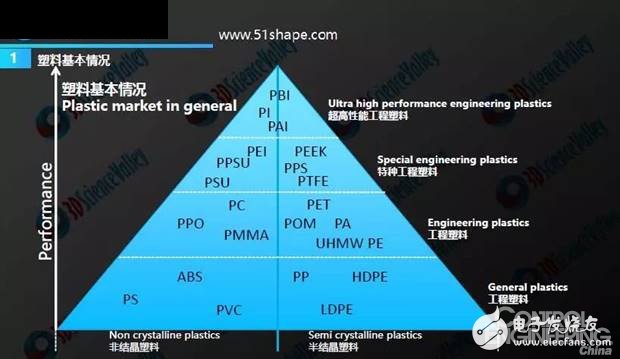
Stratasys
In terms of printing technology, Estrave AddiTIve SoluTIons, a wholly-owned subsidiary of Stratasys, has introduced a high-speed plastic 3D printing process. The company has been developing Rapid Additive Manufacturing Technology (EPSD) since 2009.
In terms of materials, Stratasys has a range of engineering grade plastics to meet the needs of demanding industrial applications.
-- FDM Thermoplastics - Print durable parts with production grade materials
ULTEM 9085: High performance components with excellent heat resistance (up to 153 ° C), mechanical strength and chemical resistance properties. Applications include functional prototypes, manufacturing tools, and small-volume, high-value production parts.
FDM Nylon 6: Tough parts combine the strength and toughness of various FDM materials with better fatigue-resistant elongation at break, suitable for printing durable prototypes, manufacturing tools that withstand harsh production environments, and meeting high functional requirements Small batch parts.
ASA: high mechanical strength
ASA is a production-grade thermoplastic with 10 fade-resistant colors, high mechanical strength and UV stability for building durable prototypes for fitting, shape and functional testing, or for end-use parts.
PC - ABS
Combining the strength and heat resistance of PC materials with the flexibility of ABS materials, it also has good feature definition and surface finish. The ability to create higher strength parts ensures better testing and prototypes that mimic the material properties of the final product.
Carbon fiber reinforced nylon material
Stratasys' nylon 12CF material for FDM 3D printing technology, containing up to 35% carbon fiber, is excellent in properties such as a final tensile strength of 76 MPa and a tensile modulus of 7529 MPa. With a flexural strength of 142 MPa, it is enough to replace metal in many applications, making it ideal for automotive, aerospace and other industries. This carbon fiber reinforced thermoplastic is used to produce high performance prototypes that can withstand the rigorous testing of production parts during design verification to meet the demanding requirements of the production environment and can be applied to fixture manufacturing on the production line.
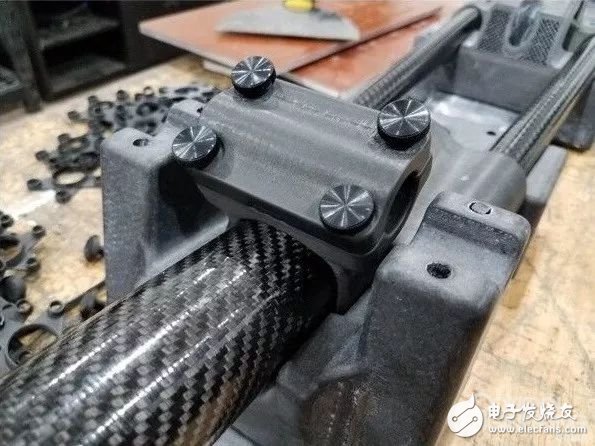
-- PolyJet Materials - Hundreds of Different Attribute Selections Digital ABS
Combining high temperature and high toughness characteristics, it simulates standard ABS plastics to create tools and prototypes that are true, precise, tough and heat resistant. Both stiffness and toughness are excellent in walls less than 1.2 mm (0.047 in.) thick.
Polymaker
Solving the economic problems of high-performance materials in the 3D printing process is the direction that Polymaker is working hard and needs to work hard. At present, Polymaker mainly has two application sectors, Polymaker consumer segment and Polymaker industrial segment.
The Polymaker consumer segment was the first to be introduced to the market, with a focus on designers, engineers and makers. This is also the main market when 3D printing became popular.
In the industrial applications sector, Polymaker launched the Polymaker Industrial product line in early 2017, which aims to develop advanced materials that combine high performance and economy, including more than four product systems and more than 20 different 3D printing engineering plastics. Application solution.
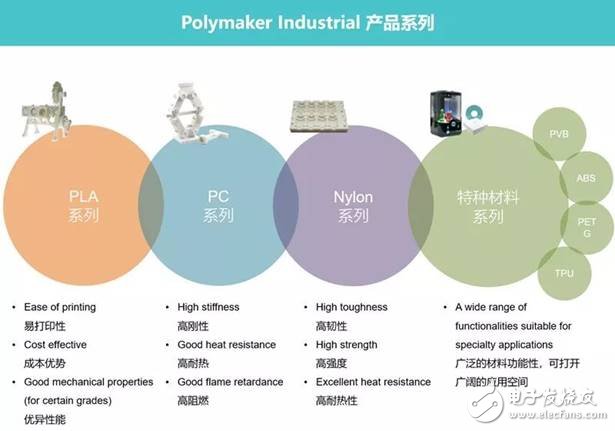
Polymaker PC
PC (polycarbonate) is one of the most widely used high performance polymer materials with good mechanical and thermal properties. However, even if the PC has such excellent performance, it has not been widely used in 3D printing. The main reason is that it is subject to some of the characteristics of traditional PC materials, making it difficult to apply to 3D printing.
In order to solve the problem of adaptability of PC materials to 3D printing, in 2016, Polymaker cooperated with Covestro to launch PC-Plus and PC-Max products. While maintaining the high performance of the PC, it greatly reduces the difficulty of printing.
Generally, general-purpose PC materials need to be heated to 110-120 ° C when the 3D printing is performed, and the printing platform is heated to 120-150 ° C. The temperature requirements of the Polymaker PC in these two aspects are only 70-80 ° C and 80-110 ° C.
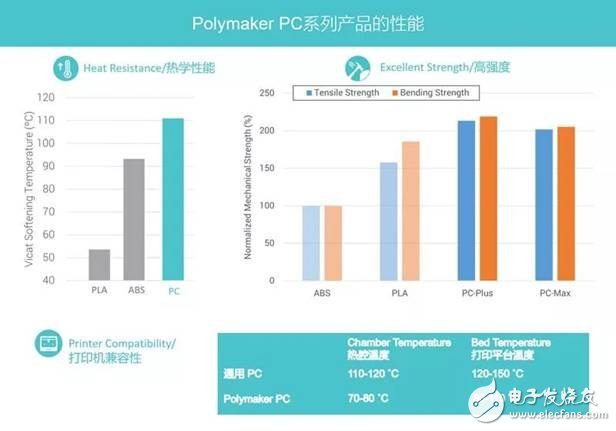
This means that general-grade industrial-grade FDM/FFF printers can print PC materials smoothly, and even some desktop-level 3D printers can use Polymaker's PC materials. And if you use traditional PC materials, the investment in hardware will be extremely large.
PolyCast
PolyCast is a material for metal casting applications. Polymaker defines this material as a fast and economical solution for metal parts.
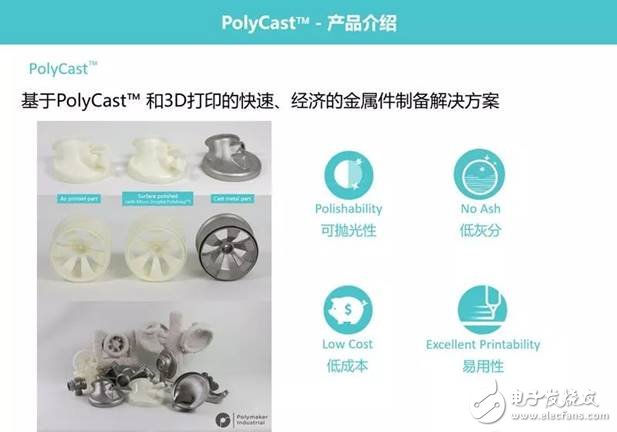
Traditional lost wax casting encounters two problems when producing small batches of products: 1. High cost, mainly the cost of mold opening; 2. Long cycle, generally takes 2-4 weeks to complete mold opening and wax mold . These problems can be solved with PolyCast materials, no mold costs, and a "wax mold" made of PolyCast material will soon be available.
Polycas is an ideal solution for small batch production and for making complex parts.
PolyCast materials have four characteristics:
Polishable: In combination with Polysher, the print has a polished surface that rivals the molded part.
Low ash: The ash data measured by the PolyCast material in the actual foundry environment is 0.003%, which can be burned out thoroughly and thoroughly to cast flawless metal parts.
Low cost: Casting with PolyCast materials is less expensive than traditional casting processes or compared to other types of 3D printing technology.
Ease of use: PolyCast® materials are extremely easy to print, and can be easily printed on almost any wire 3D printer (FDM/FFF).
PolyCast application case: SO3D & 3D Sailing users use the PolyCast technology to produce sailing parts to achieve non-standardized small batch production of parts.
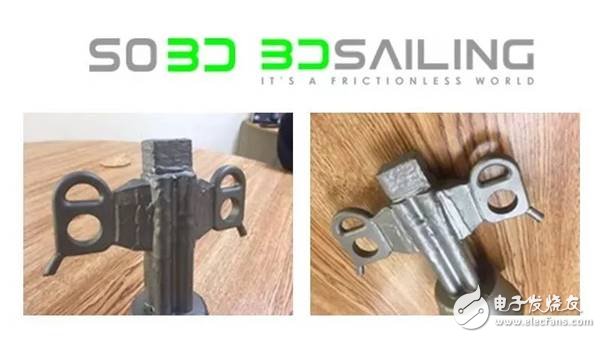
PolyMide CoPA
PA nylon is also one of the most common engineering plastics, with very good mechanical properties, but in 3D printing, the cavity and platform heating are also required to ensure that it does not warp during printing. This undoubtedly increases the difficulty of using nylon materials and the cost of use.
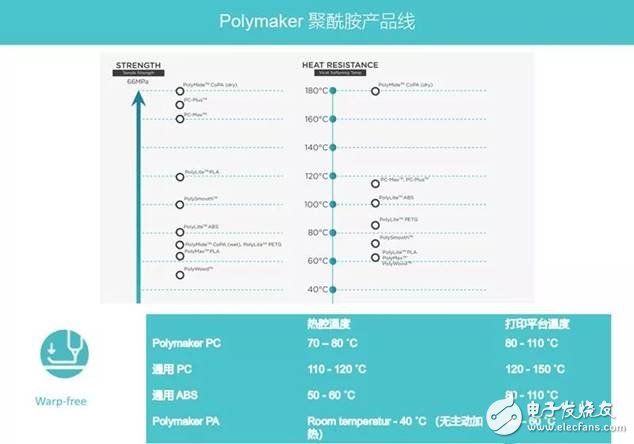
Through continuous research and development and innovation, Polymaker uses Warp-Free technology to solve the problem of easy warpage of nylon, and developed PolyMide CoPA, a warp-proof nylon wire, which eliminates the need for platform heating or cavity heating for FFF/FDM 3D printers. This nylon material can be used up to 250 °C.
PolyMide CoPA Application Case: Tongji University Zhiyuan Team participated in the 2018 Asian Shell Eco Marathon held in Singapore and won two awards: Urban Concept Car Best Design Award & Prototype ICE Group Asia Runner-up.
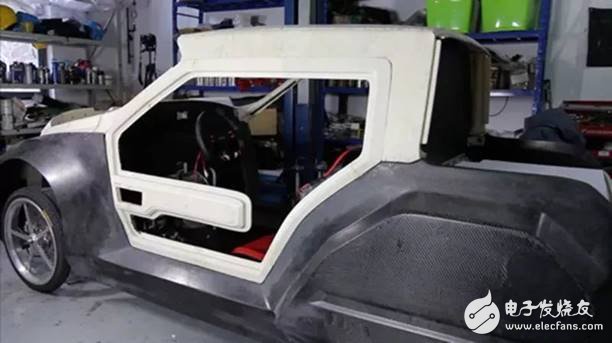
Photo: Zhiyuan Team chooses to use nylon 3D printing materials including PolyMide CoPA to make structural parts for racing cars.
When building a racing car, Zhiyuan Team needs to choose a low-cost small-volume manufacturing solution to achieve a lightweight design concept. 3D printing technology is therefore the ideal solution for them. In terms of material selection, it is necessary to meet the higher thermal and mechanical requirements of the vehicle. In the end, Zhiyuan Team chose to use nylon 3D printing materials including PolyMide CoPA to make the structural parts of the car.
Usb -C To Db9 Serial Cable,Multi-Head Optical Fiber Quick Connector,Industrial Plug Socket Connector,Industrial Plug Connector
Dongguan Aiqun Industrial Co.,Ltd , https://www.gdoikwan.com